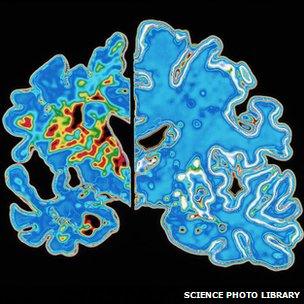Charity warns of 'retreat' from dementia research
- Published

A leading health research charity says drugs companies may "retreat" from dementia research without more support.
Alzheimer's Research UK says more government help is needed to ensure the industry does not "retreat" from the challenge of finding new drugs.
The warning follows disappointing results in recent clinical trials.
The pharmaceutical industry body, the ABPI, says there are over 200 medicines under development for Alzheimer's.
It is estimated that more than 800,000 people in the UK have dementia. The majority have Alzheimer's disease.
The numbers affected are growing fast, and the search for new treatments is becoming more urgent.
But this summer two big trials have reported disappointing results. The drugs - bapineuzumab and solanezumab - failed to show benefits that researchers had hoped to see.
'Very disappointing'
Alzheimer's Research UK fears companies may decide that putting resources into dementia is too risky. The charity's science director, Dr Eric Karran, said the trial setbacks were "very disappointing". He warned that companies could be deterred from investing in dementia.
"If you're running a business and you have options to find important new medicines in cancer, in diabetes or in neuroscience inevitably I think you have to place your bets where ultimately you will get a better chance of a return on your investment."
Dr Karran said there was a need for a new model of funding to ensure the pharmaceutical industry does not "retreat" from this challenging field of research.
"Now is certainly not the time to be giving up. But we need to accept that this is a challenging area and really bring all of our resources together from the pharmaceutical industry, from academia and from government, to tackle it."
'Pipeline' of drugs
In response, the chief executive of the Association of the British Pharmaceutical Industry, Stephen Whitehead, insisted that companies were still working on new dementia treatments.
"The industry continues to address unmet medical need in Alzheimer's as well as other neurodegenerative diseases, which are serious health challenges facing all societies with ageing demographics. Hence there is a pipeline of over 200 candidate medicines in various stages of development for Alzheimer's disease."
In March this year the prime minister said extra funding for research was a central part of his plan to tackle what he called the "national crisis" of dementia. Overall funding will increase to more than 66 million pounds by 2015.
In a statement, Andrew Chidgey from the Alzheimer's Society, said given the scale of the problem, funding for dementia was still far too low.
"Currently there are 150 times more clinical trials focusing on treating people in the late stages of cancer than Alzheimer's disease. One in three people over the age of 65 will die with dementia. More funding for research is urgently needed if we are to defeat the condition once and for all."
- Published3 July 2012
- Published26 March 2012